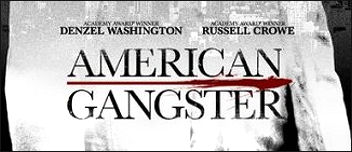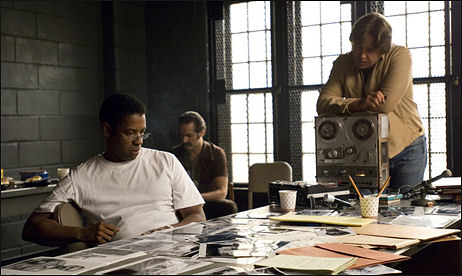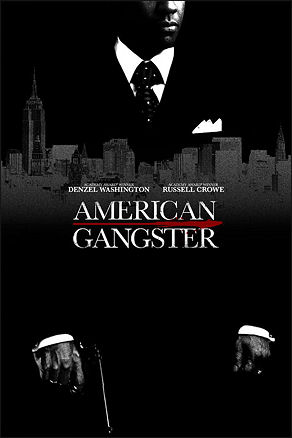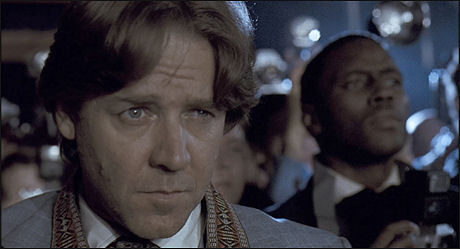Ridley Scott‘s American Gangster (Universal, 11.2) is, of course, naturally… hello?…an absolute Best Picture contender because it’s a straight, robust, high-velocity crime saga in the grand New York movie tradition of ’70s and ’80s Sidney Lumet. Which, in case you haven’t been paying attention, is a very cool and vogue-ish thing to be churning out right now, and not for ephemeral reasons.

This is not a first-rate cops-and-dealers drama by the director of Alien, Blade Runner, Gladiator and Black Hawk Down as much as a wonderfully focused and flavorful time-machine ride back to the gritty-stinky Abe Beame-Ed Koch world of Serpico, Prince of the City and The French Connection.
I’m not speaking of some sophisticated film-maven exercise but a dead-on, true-blue revisiting — a submission by a great director to an ethos and an aesthetic that feels absolutely real and true to itself, which is to say true to what happened and particularly the way life caused two dogged, determined locomotives — legendary Harlem smack dealer Frank Lucas (Denzel Washington) and his opposite number, the doggedly honest Det. Richie Roberts (Russell Crowe) — to crash into each other’s fate.
The result isn’t the craziest or most thrilling New York crime film you’ve ever seen, but one with a more authentic and character-rich sense of itself and its milieu than anything released in a very long time. It’s a film with absolute balls-to-the-wall integrity that can’t miss with audiences, and it tells a plain, strong story with a beginning, a middle and an end. It ought to score a bulls-eye with critics and the Academy and if it doesn’t there’s something wrong, and I don’t mean with the film.

On top of which it’s the best film of this type — complex, interesting, sympathetic good guy vs. complex, interesting half-sympathetic bad guy — since Heat.
Does this saga of the rise and fall of Lucas make you tear up and cry at some point? Does it unleash an emotional meltdown in your chest somewhere during the middle of the third act? No, and shame on anyone for asking. Did The French Connection or The Departed moisten tear ducts? American Gangster is what it is, and deserves a salute for this. It doesn’t pander or amplify or push buttons or pull any cheap tricks.
I was a wee bit disappointed when last Tuesday night’s screening came to an end. It had begun around 7 pm, and the closing credits were rolling north around 9:40 pm. What…only 158 minutes? I’d been given all the nutrition any moviegoer could possibly ask for, but I was Oliver Twist. I wanted more.
This is one of those movies that is so good and cocksure in its New York textures and tough hammer-like attitude, that you’re saying to yourself early on, “I don’t want this to end.” I wanted the indulgent director’s cut right then and there. I wanted Ridley to swing for the bleachers and make it three hours. Hell, I could have gone for three and a half. I wanted to pig out.

I mean, my God…even Cuba Gooding comes off pretty well in a co-starring role, and he’s one of those guys with an Irish banshee going “whooooo” behind his back.
Based on a New York magazine article by Mark Jacobson (“The Return of Superfly“) and working from a screenplay by Steve Zallian, Gangster follows the paths of Lucas and Roberts — step by step, chapter by chapter — and how they lead to a third-act showdown.
Lucas’s heroin-dealing heyday was from ’69 or so to 1976. He claimed in the Jacobson article to have grossed $1 million a day at one point. A lawman once described his operation as “one of the most outrageous international dope- smuggling gangs ever.” Lucas’s claim to fame is that he smuggled in his Vietnamese kilos (98% pure heroin) in the coffins of dead U.S. soldiers.
Lucas, we learn right off the bat, is a somewhat conservative guy. We first meet him as a driver/assistant for Ellsworth “Bumpy” Johnson (a cameo role handled by Clarence Williams III), who’s instilled in Lucas a respect for the old way of doing things. We also see from the get-go that he’s perfectly capable of pouring gasoline over some guy, lighting him up and then filling him with hot lead. But he also gets up at 5 ayem, eats breakfast in the same luncheonette every day, and takes his mother to church on Sundays.
He’s a villain, sure, but he’s fairly likable (he’s Denzel, after all) and semi-respec- table. He’s not totally crazy, and he dresses conservatively and runs his business (i.e., providing a product) like any conservative businessman would. Selling heroin is like spreading a kind of death, but I’m of the libertarian view that people have the right to dope their souls to hell if they’re so inclined. I also think guys like Donald Rumsfeld and Dick Cheney are just as evil as guys like Lucas, and perhaps even more so.
The first significant thing we see Roberts, a Manhattan detective, do is come upon a suitcase stuffed with a million untraceable bucks and promptly turn every last bill into his station chief. (Anyone who says they wouldn’t at least think about skimming a few grand is either stupid or lying.) Obviously he’s a very different bird than Frank, and yet the film gradually persuades us that they’re not so far apart.
Both adhere to a strict ethical code that sets them apart from comme ci comme ca colleagues, both see their friendships and family lives crack apart under the strain of their work and their single-minded stubbornness, and both run their own renegade teams to get a risky job done.

Deep down, American Gangster is really a procedural film about the ups and down of running a tough business. I challenge anyone who’s run his or her own business to watch it and say they don’t feel at least a little respect and sympathy for Frank, who is first and foremost a vulture and a scumbag, yes, but is also just trying to run a tight ship. It’s always the mark of a good film to persuade you to feel two ways about the same lead character.
Frank and Richie, in the final analysis, are guys who believe in discipline, hard work, integrity, family, adhering to a code. They both pay for being such hard- cases, but in real life Roberts wound up becoming a full-time attorney and wound up defending Lucas in some matter. Life is funny that way, and it sure as shit isn’t black and white.
